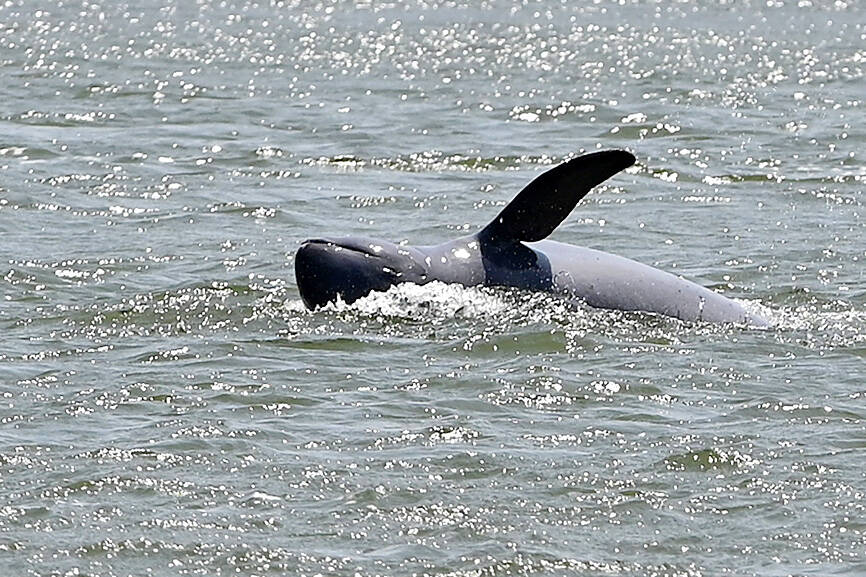Cambodian Prime Minister Hun Sen yesterday canceled a law he created just two months ago to protect critically endangered Mekong dolphins as the mammals continue to die from illegal fishing activities.
ILLEGAL FISHING
The population of Irrawaddy dolphins in the Mekong River has dwindled from 200, when the first census was taken in 1997, to just 89 in 2020 largely due to illegal fishing and habitat loss.

Photo: AFP
Hun Sen in February issued a new decree creating protection zones in a 120km stretch of the Mekong, in which fishing is banned, following the death of three dolphins in a week.
Conservationists have also stepped up efforts to protect the mammals — small, shy creatures with domed foreheads and short beaks that once swam through much of the river, all the way to the delta in Vietnam.
However, two dolphins have since died, including a four-day-old calf found dead last week entangled in fishing nets.
Hun Sen yesterday said he had decided to cancel the new decree, because “dolphins keep dying and thousands of fishing families were affected.”
“We want to protect dolphins that are at risk of becoming extinct, but dolphins keep dying,” he said at an event in Phnom Penh.
“Dolphins keep entangling in gillnets, despite the ban,” he said, referring to nets strung across the river by fishers.
LIVELIHOOD
Hun Sen said the law also affected thousands of families who depend on fishing in the Mekong.
“Shall we continue this? We must annul it and let people get benefits from the river,” he said.
Hun Sen asked authorities to implement old regulations to ban fishing in parts of the dolphin zones and to crack down on electrofishing.
Eleven dolphins died last year, bringing the total number of dead dolphins to 29 in the past three years, the World Wildlife Fund said.

BACKLASH: The National Party quit its decades-long partnership with the Liberal Party after their election loss to center-left Labor, which won a historic third term Australia’s National Party has split from its conservative coalition partner of more than 60 years, the Liberal Party, citing policy differences over renewable energy and after a resounding loss at a national election this month. “Its time to have a break,” Nationals leader David Littleproud told reporters yesterday. The split shows the pressure on Australia’s conservative parties after Prime Minister Anthony Albanese’s center-left Labor party won a historic second term in the May 3 election, powered by a voter backlash against US President Donald Trump’s policies. Under the long-standing partnership in state and federal politics, the Liberal and National coalition had shared power

A Croatian town has come up with a novel solution to solve the issue of working parents when there are no public childcare spaces available: pay grandparents to do it. Samobor, near the capital, Zagreb, has become the first in the country to run a “Grandmother-Grandfather Service,” which pays 360 euros (US$400) a month per child. The scheme allows grandparents to top up their pension, but the authorities also hope it will boost family ties and tackle social isolation as the population ages. “The benefits are multiple,” Samobor Mayor Petra Skrobot told reporters. “Pensions are rather low and for parents it is sometimes

CONTROVERSY: During the performance of Israel’s entrant Yuval Raphael’s song ‘New Day Will Rise,’ loud whistles were heard and two people tried to get on stage Austria’s JJ yesterday won the Eurovision Song Contest, with his operatic song Wasted Love triumphing at the world’s biggest live music television event. After votes from national juries around Europe and viewers from across the continent and beyond, JJ gave Austria its first victory since bearded drag performer Conchita Wurst’s 2014 triumph. After the nail-biting drama as the votes were revealed running into yesterday morning, Austria finished with 436 points, ahead of Israel — whose participation drew protests — on 357 and Estonia on 356. “Thank you to you, Europe, for making my dreams come true,” 24-year-old countertenor JJ, whose

A documentary whose main subject, 25-year-old photojournalist Fatima Hassouna, was killed in an Israeli airstrike in Gaza weeks before it premiered at Cannes stunned viewers into silence at the festival on Thursday. As the cinema lights came back on, filmmaker Sepideh Farsi held up an image of the young Palestinian woman killed with younger siblings on April 16, and encouraged the audience to stand up and clap to pay tribute. “To kill a child, to kill a photographer is unacceptable,” Farsi said. “There are still children to save. It must be done fast,” the exiled Iranian filmmaker added. With Israel